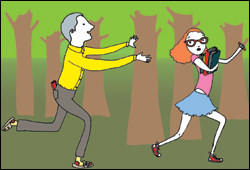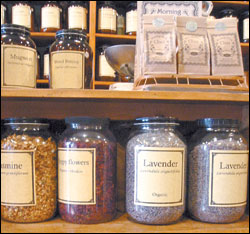After graduating from university, and with my hoped-for career as a novelist somehow not materializing, I signed up for Centrum’s 10-day Port Townsend Writers’ Conference. It sounded blissfully literary: You wrote every day, you were critiqued by someone who was a “professional,” and you got to meet other writers. I envisioned Yaddo circa the 1950s when a young Truman Capote and Carson McCullers were residents together.
But when I arrived, I was shocked to discover that of the roughly 150 participants, only five of us were under 30 and maybe 25 were male. Everyone else was female and middle-aged. Where were the young, hip writers? Where were the idiosyncratic poets? I felt too young to be friends with women my mother’s age, who had kids my age. Thankfully, I met Claire, then a 19-year-old prodigy who had just graduated college, in the lunch line. We bonded over being the youngest there and made fun of the multitude of Birkenstocks.
Each day of the conference was split into two halves: in the morning a reading by one of the teachers; and in the afternoon, we went to class. Since I was making $7 an hour as an editorial assistant, I opted for the cattle-call version of the workshop—aka the cheapest option—which was “Open Enrollment.” The other choice was a “Critiqued Workshop,” whereby you’re in a smaller setting (up to 16 participants) and work with a published writing teacher. Talking to Claire recently, she reminded me of how much the workshop operated like a support group. “It felt like we were being taught how to say, ‘Yes, I’m a writer and I’m OK,'” she recalls. “It perhaps should have been titled Confidence Building 101.”
There was also a certain demographic within the workshops, i.e., middle-aged women who had newly turned lesbian and wanted to write down the tragedy of their previously unliberated lives. This, too, lent a therapy-group aspect to our workshop.
After the third day of telling one another we were all writers and it was OK, Claire and I tried to audit other workshops. She sat in on poet Marvin Bell’s class, which she found to be small, personalized, and serious. I tried to sit in on Ursula Hegi’s workshop, but she told me I couldn’t, as she “liked to create a circle of safety for her participants and [my] presence might disrupt that.” I felt like I was in 12-step hell. When was I going to actually acquire any useful information about writing?
In the end, I sat in on poet Cornelius Eady’s workshop. I wasn’t taught anything new about poetry, but I did find enormous pleasure in watching how he taught. There was a lot of bad writing that he easily could have dismissed, but he didn’t. He was a magician of diplomacy, encouraging one student to avoid words like “soul” and “depressed” in her poetry and instead try using descriptions that contained concrete details.
The morning readings were much more educational. As Claire puts it, “They offered a more intimate view of the teachers themselves. In the classroom setting, the teachers were more didactic; at their readings, they were intimate and vulnerable, as if they were saying, ‘I have been critiquing your work all week, now let me show you mine.'” Most of the writers I hadn’t heard of, but I came away from the readings wanting to know more of their work.
Then there was the sex and debauchery. Perhaps because they were already famous—well, published—writers who had been invited to teach us mere wanna-bes, there was an assumption that they might be able to get a little nookie out of the deal. Undeniably, one of the male teachers tried to make out with one of my under-30 compatriots; she turned him down, but then the next day we saw him walking off toward the beach with an alternate “victim” and a bottle of wine in tow. It was unbelievably clichéd, terribly amusing, and completely off-putting. When said teacher tried to talk to me with his shirt unbuttoned to his navel and his gold chain weighing him down, I ran for the hills.
Claire was shocked by the amount of drinking. “It was even on the schedule. It said something like, ‘4–6 p.m. meet on the lawn for snacks and libations.'” Indeed, anyone who had a car had a lot of cachet, because they could run into Port Townsend for alcohol.
What about the bed-hopping between bungalows and tents? Neither Claire nor I observed any such misdeeds directly—which is not to say they didn’t happen. She says, “The whole conference was like unsupervised summer camp with lots of horny 14-year-olds running wild while their unknowing counselors slept soundly.”
Yet ultimately it was a remarkable 10 days of being immersed in literature. You could talk to anyone about reading and writing and know that their response would be one of passion, as opposed to boredom. The setting of Fort Worden State Park was gorgeous. We took many midnight walks through the woods to the beach, where you could see phosphorescence around your ankles in the bitingly cold water. Port Townsend itself is chock-full of bookshops and nookish cafes to sit in with a hot cup of tea and a book. And even though the classes felt like a Stuart Smalley workshop, even if they didn’t really make me a better writer (that only comes with time and experience, I’ve learned), they certainly gave me something to write about—and I’m grateful for that.
This year’s Centrum Port Townsend Writers’ Conference runs July 15–25; 360-385-3102 and www.centrum.org for details.







